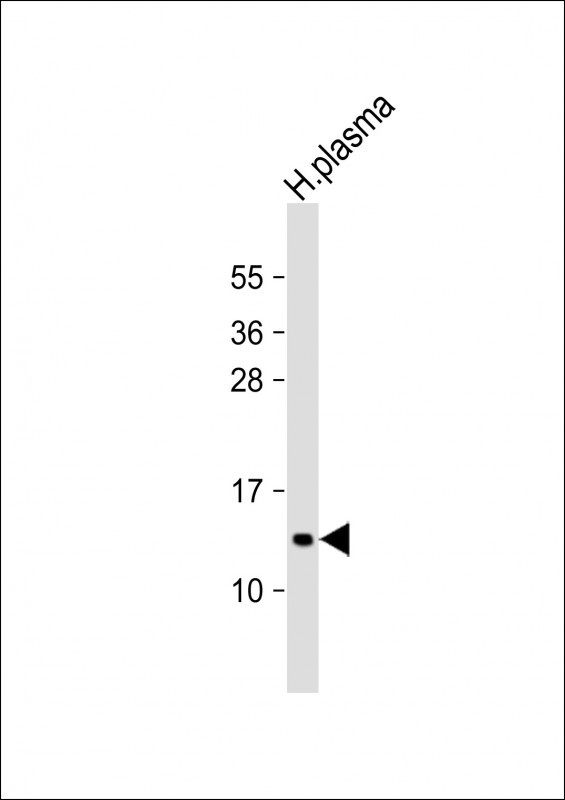
| WB | 1/2000 | Human,Mouse,Rat |
| IF | 咨询技术 | Human,Mouse,Rat |
| IHC | 咨询技术 | Human,Mouse,Rat |
| ICC | 技术咨询 | Human,Mouse,Rat |
| FCM | 咨询技术 | Human,Mouse,Rat |
| Elisa | 咨询技术 | Human,Mouse,Rat |
| Aliases | Apolipoprotein C-III, Apo-CIII, ApoC-III, Apolipoprotein C3, APOC3 |
| Entrez GeneID | 345 |
| WB Predicted band size | 10.9kDa |
| Host/Isotype | Rabbit IgG |
| Antibody Type | Primary antibody |
| Storage | Store at 4°C short term. Aliquot and store at -20°C long term. Avoid freeze/thaw cycles. |
| Species Reactivity | Human |
| Immunogen | This APOC3 antibody is generated from rabbits immunized with a KLH conjugated synthetic peptide between 70~99 amino acids from the C-term region of human APOC3. |
| Formulation | Purified antibody in PBS with 0.05% sodium azide,1%BSA and 50% glycerol.prepared by Saturated Ammonium Sulfate (SAS) . |
+ +
以下是关于APOC3抗体的3篇参考文献,包含文献名称、作者及摘要内容概括:
---
1. **文献名称**:*Antisense Inhibition of Apolipoprotein C-III in Patients with Hypertriglyceridemia*
**作者**:Dewey, F.E., et al.
**摘要**:该研究报道了使用反义寡核苷酸(volanesorsen)靶向抑制APOC3的Ⅲ期临床试验结果,显示其可显著降低高甘油三酯血症患者的甘油三酯水平,并改善心血管代谢风险。
2. **文献名称**:*APOC3 Inhibition as a Novel Therapeutic Strategy for Hypertriglyceridemia and Cardiovascular Risk Reduction*
**作者**:Gaudet, D., et al.
**摘要**:研究探讨了APOC3抗体疗法通过抑制载脂蛋白C-III功能,减少乳糜微粒残留和极低密度脂蛋白(VLDL)生成,从而降低甘油三酯水平和动脉粥样硬化风险的作用机制。
3. **文献名称**:*Targeting APOC3 in Atherogenic Dyslipidemia: From Genetic Insights to Therapeutic Potential*
**作者**:Alexander, V.J., et al.
**摘要**:综述APOC3在脂代谢中的关键作用,分析其抗体或基因沉默疗法在治疗家族性乳糜微粒血症(FCS)和代谢综合征中的潜力,强调其对心血管事件的长期影响。
---
**备注**:以上文献均聚焦于APOC3抗体或靶向疗法的临床前及临床研究,涉及血脂异常、心血管疾病等领域。如需具体发表年份或期刊,建议通过PubMed或相关数据库进一步检索。
Apolipoprotein C-III (APOC3) is a key regulator of lipid metabolism, primarily associated with triglyceride-rich lipoproteins (TRLs) such as VLDL and chylomicrons. It inhibits lipoprotein lipase (LPL), the enzyme responsible for hydrolyzing triglycerides, and interferes with hepatic uptake of TRL remnants, contributing to elevated plasma triglyceride levels. Genetic studies have linked APOC3 mutations to reduced cardiovascular risk, making it a therapeutic target for hypertriglyceridemia and atherosclerosis.
APOC3-targeting antibodies represent a novel approach to modulate lipid metabolism. These monoclonal antibodies are designed to neutralize APOC3. thereby enhancing LPL activity and accelerating TRL clearance. Preclinical studies show that APOC3 inhibition reduces triglyceride levels by up to 70% and attenuates atherosclerosis progression in animal models. Clinical trials, including those involving volanesorsen (an antisense oligonucleotide), validated APOC3's therapeutic potential, though safety concerns prompted interest in antibody-based alternatives for improved specificity and tolerability.
Recent antibody candidates bind APOC3 on lipoproteins, disrupting its inhibitory effects on LPL and hepatic receptors. Early-phase trials demonstrate significant triglyceride-lowering effects in patients with severe hypertriglyceridemia, familial chylomicronemia syndrome, or metabolic disorders. Research continues to explore long-term benefits on cardiovascular outcomes and synergy with other lipid-lowering therapies. APOC3 antibodies may offer a promising strategy for addressing residual cardiovascular risks in statin-treated patients and rare lipid disorders.
×